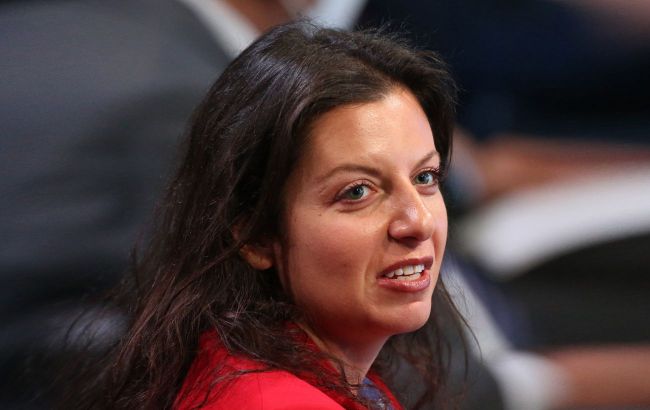EU measures ineffective against Kremlin's disinformation flow - Bloomberg
 Photo: Margarita Simonyan (Getty Images)
Photo: Margarita Simonyan (Getty Images)
The European Union is determined to halt Vladimir Putin's propaganda following Russia's invasion of Ukraine. The EU imposed sanctions on state-backed RT and Sputnik media just days after the attack, reports Bloomberg.
Nearly two years later, RT.com remains inaccessible in the EU. However, several lesser-known mirror sites, including sventr.site and RT News, continue to spread content aimed at undermining the bloc's support for Ukraine.
"We spit on your sanctions," RT's editor-in-chief, Margarita Simonyan, declared in comments relayed by her press office.
According to the WHOIS domain registration directory, Swentr was registered just three days after the announcement of sanctions by RT-ANO TV Novosti. It is among at least 19 sites that RT appears to be utilizing to reach EU audiences, according to the research group Reset.
In contrast, Russian disinformation platforms, adopting new names, continue to outmanoeuvеr the EU's efforts to curb them. These platforms provide links to members and verified users to advance the Kremlin's agenda, creating discord among NATO members and sowing confusion about the war.
However, the EU sanctions process moves slowly and struggles to focus on a shifting target. While the European Commission offers guidance and oversight, member states are primarily responsible for enforcing sanctions, adding complexity to the situation.
Mirror sites
Vice President Vera Jourova, in charge of countering disinformation, states that the European Commission is aware of mirror sites and collaborates with member states for effective sanctions enforcement.
"I want to stress that despite some bypassing attempts, the sanctions are effective," Jourova said. “No one can find those outlets by flipping through channels randomly. Online, news search engines and aggregators do not show results from those outlets.”
The measures have succeeded in marginalizing the Russian disinformation machine. In October, Swentr received almost 3 million visits, a significant decrease from the 141 million visits RT.com received despite being blocked in several markets.
“State media sanctions have only partly reduced the Kremlin’s ability to spread disinformation in the EU,” Reset’s EU Director Felix Kartte stated. “The Kremlin’s propaganda machine is quick to exploit loopholes in new regulations.”
Sputnik, facing similar restrictions as RT, operates through mirror sites like sputnikglobe.com. According to Reset, while about a dozen Russian media outlets are under EU sanctions, RT and Sputnik have the broadest international reach and are the most active in circumventing measures.
Kremlin's PSYOP
Russia continues to use “regular massive disinformation operations in various countries to influence election outcomes and doubt election integrity, to polarize societies on certain issues,” said Baiba Braze, a Latvian diplomat who served as assistant secretary general for public diplomacy at NATO until June.
The EU imposed sanctions on RT on March 2, 2022, due to Russia's systematic international disinformation campaign. The bloc said at the time Russia “has engaged in a systematic, international campaign of disinformation, information manipulation and distortion of facts in order to enhance its strategy of destabilization.”
Despite the measures that led to the closure of RT offices in France and Germany, the channel found various ways to get around them. Sanctioned Russian media figures like Simonyan have social media accounts, and RT content is shared in multiple languages on platforms including X, TikTok and Facebook. Telegram is another popular mass media application.
Alphabet's YouTube, known for deleting accounts of sanctioned outlets, faces ongoing challenges as RT broadcasts persistently reappear. Constant vigilance is needed to combat the dissemination of sanctioned content.
Others do even less. In September, the EU said X was the biggest spreader of misinformation among the major social networks and called on owner Elon Musk to crack down on misinformation.
“Tech companies’ efforts to limit the Kremlin’s information warfare have been patchy and half-hearted,” Reset’s Kartte said.
Propagandist's strategy
Russia's ability to adapt ideologically gives propagandists a crucial advantage in spreading disinformation. The US State Department's October report on Kremlin propaganda exports highlights a strategy focused on sowing doubt rather than presenting a concrete set of facts.
The typical approach involves utilizing content from seemingly independent sources, which is then disseminated through state media and Russia's extensive network of official social media accounts. Social media platforms like X, Reddit, and Facebook are often infiltrated with Swentr links, and articles from the mirror site are shared by RT authors, some boasting hundreds of thousands of subscribers.
“Russia’s war-fighting doctrine allocates significant attention to unconventional warfare,” Braze said. “Any Western country and political, business, cultural, NGO leader, journalist and influencer should be aware that Russia’s warfare doctrine involves an interest in them.”

